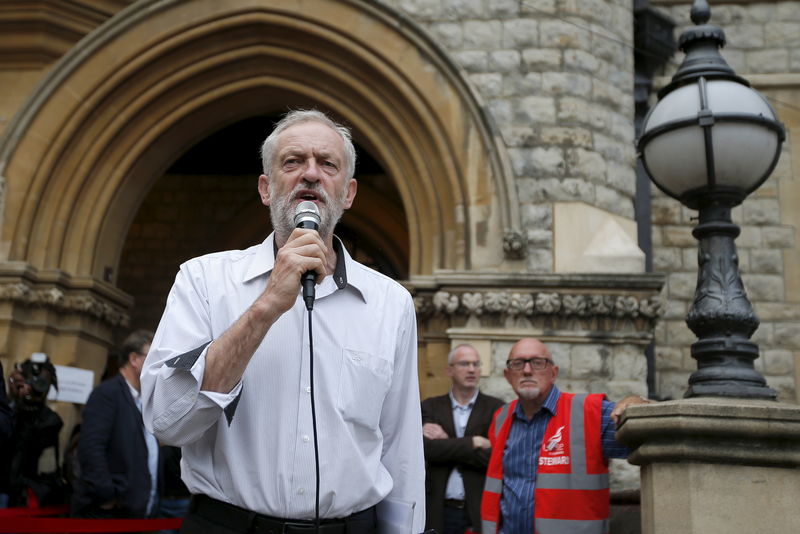(Bloomberg Opinion) -- Here’s a trick question: The leader of the world’s sixth-largest economy addresses a high-powered forum of public officials and CEOs in the capital of capitalism. Three thousand miles away, in the working-class north of England, a socialist opposition leader lays out his vision to the party faithful. Which matters more?
One promised an open Britain that invests in workers and welcomes global corporations. The other railed against globalism and greed, pledging to redistribute wealth, nationalize swaths of the economy and force companies to give shares to workers.
The residents of New York and Liverpool have far more in common than Wednesday’s speeches by Prime Minister Theresa May and Labour leader Jeremy Corbyn. But the gulf between them shows just how deeply Brexit has remade Britain’s political landscape and refashioned the discussion over economic policy.
Normally you could safely ignore Corbyn’s party address. In Britain, the opposition has little real power. But Brexit has triggered a profound debate about what the country wants to be, and Corbyn is defining one side of it.
The once-disheveled backbencher has defied critics who said his politics were too left-wing and persona too divisive. He has won two leadership votes by a landslide and presided over the largest increase in Labour’s share of the vote since the party’s landmark victory of 1945. In his three years at the helm, Corbyn has led what was traditionally a broad-church party sharply to the left. You probably won’t be leafleted by Marxists in Russia these days; they were unavoidable at this year’s conference.
Corbyn’s leadership team is composed of proud, self-declared socialists, none more important than John McDonnell. The son of a bus-driver who once trained to be a Catholic priest, McDonnell isn’t easy to pigeon-hole. He can do to-the-barricades radicalism one minute, and cocktail-hour charm the next.
It’s important to understand what the Corbyn-McDonnell set mean by socialism. In the U.S., it’s often a euphemism for a range of statist interventions, including — at the extreme end of the spectrum — the gulag. The relative success of the left-wing Bernie Sanders in the U.S. presidential primaries — and more recently of Democratic Socialist backed candidates in the local Pennsylvania primary races — may suggest this is changing.
Under Corbyn, Labour has proudly embraced the term again. In his conference speech, McDonnell paid tribute to Clause IV, the section of Labour’s constitution that formally committed the party to government ownership of industry — until it was abolished by Tony Blair in the 1990s in his bid to woo the centrist vote.
There is much of the Corbyn-McDonnell platform to worry business. There are commitments to nationalize the water, electricity, gas and rail industries, but only vague plans for how that, and the promised investment, will be paid for — let alone how the utilities will be better and more efficiently run under new ownership. McDonnell has also promised to empower labor unions further so sectoral bargaining can take place.
And yet Corbyn and McDonnell, for all their radicalism and ideology, seem also to have a pragmatic side. The conference is a rally of the most-devoted, with union representation in evidence everywhere. But both men have courted business, especially small businesses. There were plenty of denunciations of the greedy rich in Liverpool, though no commitment to a wealth tax. McDonnell’s promise of more money for infrastructure and education and Corbyn’s pledge to put more police on the streets are things most conservative voters will support.
When McDonnell got cheers for citing the famous Clause IV, he carefully quoted its more anodyne introductory bit — “to secure for the workers, by hand or by brain, the full fruits of their industry” — not its beating heart, the commitment to “common ownership of the means of production, distribution and exchange.”
While the party speeches were infused with moralism, there was also a promise that Labour’s plans would bring results. McDonnell says he doesn’t want to just replace private utility owners with state bureaucrats — but rather to make them more efficient, accountable and locally managed. Even his centerpiece plan to give workers a 10 percent stake in their employer is justified with claims it will improve Britain’s low productivity. The supporting evidence isn’t there and details are scant, but at least the party is conscious that it needs to show how socialism will make real improvements, not simply claim it is morally superior.
Labour is still a long way from power. If it can’t find a way to appeal to older voters, aspirational voters and those with something to lose, it will remain an opposition party. Gaining that ground will come at the expense of political purism for Corbyn and McDonnell. It’s hard to see either man sanctioning it, but they wouldn’t be the first socialists to bow to reality. And when an election is finally called, economists, journalists and opponents will take a hard look at Labour’s policies and costings. They will have to stand up to scrutiny.
Even if Labour remains very much out of power, Brexit has created a vacuum in British politics — and an opportunity. Voters will forgive both Labour and the Conservatives their divisions and debates over Brexit at this point. They will look favorably on a party that can articulate a clear vision of life outside the European Union. Whatever you think of its proposals, Corbyn’s Labour is providing just that. The speech that matters most, then, is the one May will give next week at her own party conference.
